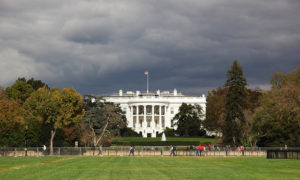How Trump Will Fail Transgender Youth
Last Wednesday the Trump administration overturned Obama’s transgender student protection directive, which ordered schools to let transgender students use whatever bathrooms and locker rooms match their gender identities. Thirteen states sued the Obama administration soon after the directive was issued in May of last year, and then federal judge Reed O’Connor of Texas issued an injunction to block it. According to the New York Times, President Trump had decided to leave the injunction in place, but then changed his mind and overturned Obama’s directive altogether.
It’s been reported that the Trump administration sees trans-bathroom rights as a state issue, not a federal one, hence the decision. “Schools, communities and families can find—and in many cases have found—solutions that protect all students,” said Secretary of Education Betsy DeVos. Many conservatives, including Students and Parents for Privacy member Vicki Wilson, applauded the president’s decision to protect girls from sharing bathrooms and locker rooms with young men who they say are “struggling with these issues” (even though, as I’ve mentioned before, trans people are not confused). DeVos says anti-bullying policies will still remain intact, but is that enough to protect trans youth? Studies suggest that anti-LGBTQ legislation does the exact opposite.
A study recently published in JAMA looked at the relationship between legalized same-sex marriage (prior to the 2015 Supreme Court decision) and suicide attempts among LGBTQ youth. “Same-sex marriage policies were associated with a 7 percent reduction in the proportion of all high school students reporting a suicide attempt within the past year. The effect was concentrated among adolescents who were sexual minorities,” the study reports. “As countries around the world consider enabling or restricting same-sex marriage,” the researchers conclude, “we provide evidence that implementing same-sex marriage policies was associated with improved population health.” While the report only focuses on marriage equality and not transgender bathroom policies, this study suggests that government limitations of LGBTQ rights in general further stigmatize LGBTQ youth and could lead more LGBTQ youth to attempt suicide.
It doesn’t help that trans people are more likely to attempt suicide than cisgender (non-transgender), lesbian, gay, or bisexual people. According to a 2014 Williams Institute study, the rate of suicide attempts among transgender and gender nonconforming adults is at 41 percent, compared to 20 percent among lesbians, gays, and bisexuals and 4.6 percent among the general population.
But all is not lost. In a recent Facebook video, the ACLU reminds us that “the withdrawal of that guidance does not change what the law is. The courts decide what the law is.” The video also announced that Gavin Grimm’s case will still go before the Supreme Court on March 28th.
For those unfamiliar, Grimm is a seventeen-year-old trans student in Virginia who sued his high school in 2015 for not letting him use the boy’s bathroom. After the Fourth U.S. Circuit Court of Appeals ruled in favor of him, the Supreme Court took the case after the school board filed an appeal this past October. The case received national attention after actress Laverne Cox gave Grimm a shout-out at this year’s Grammy awards. Grimm spoke at a rally held outside the White House soon after the Trump administration made its decision. Grimm told the crowd:
In one month, I will do what few teenagers have the chance to do: stand before the US Supreme Court because my lawyers from the ACLU will be asking the court to decide whether transgender students like me have the right to be treated just like our peers at school. We will not be beaten down by this administration or any. What can happen today does not mean my case ends.
Not only is the ACLU fighting back, but so is the American Humanist Association. In a statement released shortly after Trump’s decision, AHA Executive Director Roy Speckhardt said, “The American Humanist Association will continue to actively challenge religious extremism and prejudice against the LGBTQ community as a longtime supporter of the rights of LGBTQ individuals.” The AHA has partnered with the National LGBTQ Task Force and the Trans United Fund to provide ways humanists can help fight for LGBTQ rights. (For volunteer opportunities, contact the AHA’s social justice coordinator Sincere Kirabo.)
Whatever may come of Grimm’s case, we must continue to fight for equality for all people, including trans and gender nonconforming people. The resistance is growing, and we must not let Trump and his conservative agenda undo all the progress made for LGBTQ rights throughout the decades.

